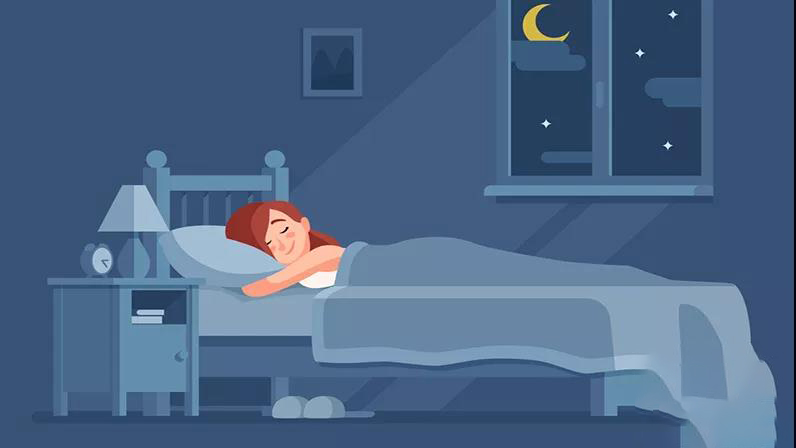
Lack of sleep will affect our appetite and make us eat more. A meta-analysis in 2019 showed that for every hour of sleep lost, the risk of obesity increased by 9%. Since lack of sleep will increase weight, can we lose weight by prolonging sleep time?
In a randomized clinical trial of 80 adults published in JAMA internal medicine on February 7, ESRA tasali, MD, director of the University of Chicago medicine sleep center, and her colleagues found that, Overweight people who habitually sleep less than 6.5 hours a night can reduce their total daily calorie intake by 270 kcal after extending their sleep time by 1.2 hours through personalized sleep counseling.
According to this trend, a person can lose 12 kilograms just by sleeping a little more in three years, the researchers said.

The new study not only studied the effect of prolonged sleep on calorie intake, but also important that all operations were carried out in a real environment without any manipulation or control of participants’ eating habits.
The subjects slept in their own beds, and the researchers tracked their sleep with wearable devices. In addition, their lives were normal without any intervention of diet or exercise guidance.
The mainstream view is that the main reason for the prevalence of obesity in modern society is the increase of calorie intake, not the lack of exercise. To objectively track participants’ calorie intake, the researchers used a “double labeled water” method to observe changes in energy storage.
In the water molecules of double labeled water, the elements of hydrogen and oxygen are replaced by their isotopes deuterium and oxygen-18. Deuterium and oxygen-18 are naturally stable isotopes without radioactivity.
When subjects drink the double labeled water, the labeled isotopes will participate in the metabolic process in the body and be discharged through urine, sweat and exhaled carbon dioxide.
By tracking the changes of isotopic peaks in urine, the researchers can calculate the energy metabolism of the human body. Dr Dale a. Schoeller, senior author of the study and emeritus professor of nutritional science at the University of Wisconsin – Madison, said, “this is the gold standard for objectively measuring daily energy consumption in a non laboratory real-world environment, which has changed the way human obesity is studied”.
The study lasted for four weeks. The first two weeks were used to collect baseline information about sleep and calorie intake, and the second two weeks were used to monitor the effect of sleep intervention.
In tasali’s view, the most surprising aspect of the study is the simplicity of the intervention. “Most of the other laboratory studies on this topic are short-term settings that last only a few days, and food intake is calculated by how much subjects consume from the diet they provide,” she said.
“In our study, we only controlled sleep. Participants ate whatever they wanted. They didn’t need any food records or other means to track their nutritional intake.”

In addition, subjects who received only one sleep consultation could change their bedtime habits and prolong their sleep time.
Tasali added that the researchers tested sleep health training for each subject, discussed their own personal sleep environment, and provided customized suggestions on the changes they could make, hoping to increase their daily sleep hours to 8.5 hours. In addition, the subjects did not know that the sleep pattern was the real thing when they were recruited.
After only one consultation, the subjects’ sleep time increased by an average of more than one hour per night (the study found that controlling the use of electronic devices before going to bed is the key to prolonging sleep).
Although the researchers did not require subjects to change other lifestyles, most people’s diet decreased significantly, reducing an average of 270 kcal per day, equivalent to eating less than a cheeseburger, and some participants even reduced their daily energy intake by 500 kcal.
In fact, a 2011 study discussed the relationship between sleep and appetite. Marie Pierre st onge, an associate professor of nutritional medicine at Columbia University, and colleagues found that people who slept only four hours a night ate more the next day, with about 300kcal of extra calories. This coincides with the new findings of tasali’s team.
In addition, sleep deprivation will increase ghrelin production, and lack of sleep will reduce the content of leptin in the body, which will lead to food intake and weight gain.
What’s worse, lack of sleep also makes people want to eat high salt, high sugar and high-fat foods. These junk foods will stimulate the reward system in the brain and plunge the body into a vicious circle of eating more and more.

“It wasn’t a weight loss study,” tasali said, “But even in just two weeks, we have shown reduced calorie intake and negative energy balance (calorie intake is less than consumption) Quantitative evidence. If you maintain a healthy sleep habit for a long time, it will bring clinically important weight loss over time. Many people work very hard to find ways to reduce their calorie intake – so just sleep more. ” However, the authors of the study also said in the paper that because the study was carried out in overweight people and excluded those who had sleep apnea or needed to work at night, the observation time of calorie intake after prolonged sleep was only two weeks, so the result of “sleeping more and eating less” has certain limitations.

Finally, tasali and her team hope to test the potential mechanisms that may explain these results, and believe that this work should inspire new and larger weight control studies to determine whether prolonged sleep can support weight loss and help prevent or reverse obesity.
“In our early work, we learned that sleep is important for appetite regulation,” tasali said. “Now we’ve shown that in real life, you can sleep longer and reduce your calorie intake without changing any other lifestyle. It can really help those who need to lose weight.”
Comments